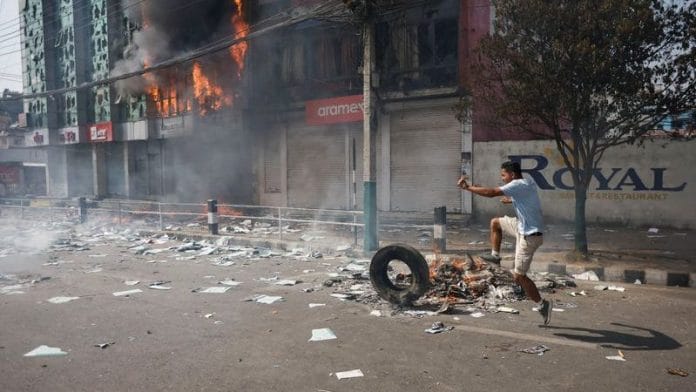Almost 50 days since Nepal witnessed a major Gen Z-led movement that toppled an elected government, the interim government led by Prime Minister Sushila Karki is facing an uphill task of holding elections by 5 March 2026. This ambitious timeline of six months was kept to bring a new political structure in the country within a democratic framework, addressing the key demands of the Gen Z youth — introducing best practices in governance, tackling corruption, generating new employment and ensuring political stability.
However, the current internal dynamics present a very gloomy picture as the consensus among the three key stakeholders — the government, political parties, and Gen Z — is still negotiating the future course with no clarity on issues like the government formation, the role of the Gen Z youth, and the readiness of the traditional political parties to carry out major reforms within their party core.
On 30 October, the three stakeholders sat together to converse for the first time since the September movement to discuss a path forward leading to elections. The political parties stand united in holding elections. However, issues like the dissolution of the House of Representatives in September by the President, which the Communist Party of Nepal-UML (CPN-UML) alleges to be unconstitutional and wants restored, the royalists — the Rastriya Prajatantrik Party — demand that the monarchy be restored.
Others, including the Nepali Congress Party, are citing March as an unsuitable month to hold elections in the hilly regions due to extreme cold. All are looking to buy more time. There are also concerns about the viability of the security infrastructure within the country, which is not sufficient and suitable for holding elections.
Gradual progress for the interim government
The on-ground observations remain pessimistic about the rise of a ‘Naya Nepal’ — a term that found prominence after the advent of democracy in the country in 2008 — following the abolishment of the monarchy. This phrase keeps making rounds with no headway made or tangible visible outcomes. No wonder it is again making headlines.
Good news, there is no deadlock. The interim government is slowly expanding the cabinet, with now ten ministers in the cabinet holding different portfolios such as home, energy, education and science, communication and information, health, sports and youth affairs, including key portfolios like foreign affairs, employment, and defence with the Prime Minister herself.
However, a strangely interesting development is taking place that could cause a probable delay in holding the election on the set deadline, besides the reason cited above. Following the Gen Z movement in Nepal, nearly 1,000 personnel belonging to the Nepal Police and Armed Police Force have reportedly resigned in the last three months.
Also read: Ladakh to Mizoram—India’s border regions are unstable. We need a new internal security policy
Gen-Z protests contributed to resignations
On October 31, the Kathmandu Post reported that “about 450 personnel from the Nepal Police and 550 from the Armed Police Force (APF), including both higher and lower-ranked officers, have left the service. Some of them had completed 20 years of service, while others had served for only about five years.” The report further adds, “Gen Z protests has demoralised many personnel, contributing to the rising number of resignations.”
These resignations have reportedly been prompted by a few amendments aimed at curtailing perks and social security, but it is significant when read against the backdrop of the Gen Z uprising that witnessed the death of civilians, including Gen Z youth activists, and a few police personnel. With the political situation in Nepal still unclear and stability a distant reality, such resignations present two realities.
First, while government jobs like police offer guaranteed monetary and social security benefits, they are also a risky proposition and often a risk to life. During the Maoist insurgency, the police were at the heart of the Maoists’ attacks. Between 1996 and 2006, Maoists attacked police stations, looted the arsenals, and many police personnel lost their lives.
There is little doubt that police, while assigned to protect, are also at risk of fighting forces like Gen Z or the Maoists that the political establishment deems a threat, leading to a dilemma that prompts demoralisation.
Secondly, Nepal has seen a rise in outward migration to third countries in the past three decades, including to Australia, Malaysia, Japan, and Gulf countries. With looming unemployment — a key factor in the Gen Z uprising — political instability, deadlocks, and a precarious security situation, finding employment elsewhere is still preferred and often a safe option. Therefore, the Gen Z movement could be prompting another phase of gloom and pessimism, where leaving the country could be a better alternative.
To conclude, creating a ‘Naya Nepal’ rooted in vibrant democracy, strong and independent institutions — judiciary, executive and legislature — good governance, and opportunities at home demands serious political reforms. But this may be impossible for the interim government, which is left with just five months before the elections on 5 March, if they happen. However, what could be a possibility is that the traditional parties seriously fix their internal structures and move past the ageing leadership that has dominated politics for the past 17 years.
At the same time, the growing number of police and armed police personnel resigning early signals a troubling shift. Beyond what Gen Z wants or what the interim government can deliver, this trend reflects not just the fading allure of government jobs but a deeper search for safety, dignity, and better livelihoods.
Rishi Gupta is a commentator on global affairs. Views are personal.
(Edited by Saptak Datta)






